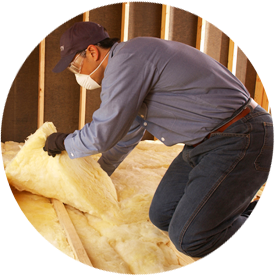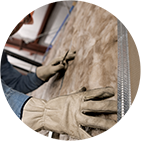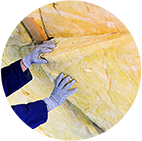- 6405 172nd Street NE, Suite C Arlington, WA 98223
- |Contact Us
FAQ
It’s best to learn about the benefits of insulation and the different types of insulation available before beginning your project. Below, we have compiled a list of answers to frequently asked insulation questions. If you don’t find what you’re looking for, contact us! We are happy to help.
Insulation
What is insulation and how does it work?
Insulation is a material that stops the transfer of heat and helps increase the energy efficiency of your home. In the summer, it stops warm air from leaking in, and during the winter, it helps heat stay in your home rather than escaping out. How insulation stops heat depends on the type / material.
What are the different types of insulation I can use?
There are many different types of insulation available:
- Fiberglass (loose-fill or blanket / batts and rolls)
- Cellulose
- Spray foam
- Radiant barrier
How much insulation do I need to install?
A few factors determine how much insulation you need to install, including:
- Where you live
- How old your home is
- Area(s) of your home you need to insulate
- And more
Where should I insulate my home?
It’s best to talk to a professional insulation contractor about where to insulate in your home, but in general, your whole house should be insulated:
- Attic
- Basement
- Any crawl spaces in your home
- Interior and exterior walls
- And more
What is R-value?
If you’ve ever talked to an insulation contractor, you’ve undoubtedly heard the term “R-value.” Basically, the R-value of a certain type of insulation refers to how effective it is at stopping heat transfer! The R-value depends on the material, thickness, and density of the insulation, and of course, installation (improperly installed insulation is almost like having no insulation at all!). Read more about the R-value of insulation »
What is the difference between batt and blown-in insulation?
Batt insulation comes in pre-cut panels, and is one of the most common forms of insulation available. It resembles a blanket. “Blow-in” refers to a method of installation—blown-in, or blow-in, insulation is installed with a special blowing device. Blown-in insulation comes in loose-fill form and because of this, better fits irregular and hard-to-reach areas. Read more about batt vs. blown-in insulation »
What is rockwool insulation made of?
A thermal material, rockwool insulation consists of natural minerals spun into small, high temperature-resistant fibers and is available in batt, blown-in/loose-fill and rigid/fibrous form. Rockwool insulation is often used for thermal control, acoustical comfort and energy savings.
How much does it cost to install spray foam?
In general, open-cell spray foam is 35 to 55 cents per board foot, and closed-cell spray foam is $1.00 – $2.00 per board foot. Here’s a general example: 3,000 board feet of space at 0.50 = $1,500. According to HomeAdvisor, the average cost of spray foam installation in the Arlington, Washington area (based on 9 cost profiles) is $2,533. Read more about the cost of spray foam insulation »
Can insulation be reused?
Yes, some types of insulation can be reused. When installed by professionals, cellulose insulation can often be completely recovered and reused on site, leaving hardly any excess material to go to waste. Special machines used in the blown-in process allow extra material to be vacuumed up and blown back in on site or salvaged for future installation. Fiberglass insulation can also be reused after the initial installation. It can be reclaimed from demolition debris and recycled into a new product as well.

Our insulation team adds energy efficiency, comfort and value to new and existing homes.

Pacific Partners Insulation North is a leading installer of commercial fiberglass, rigid board and rockwool insulation.

Pacific Partners Insulation North provides home insulation removal services.


